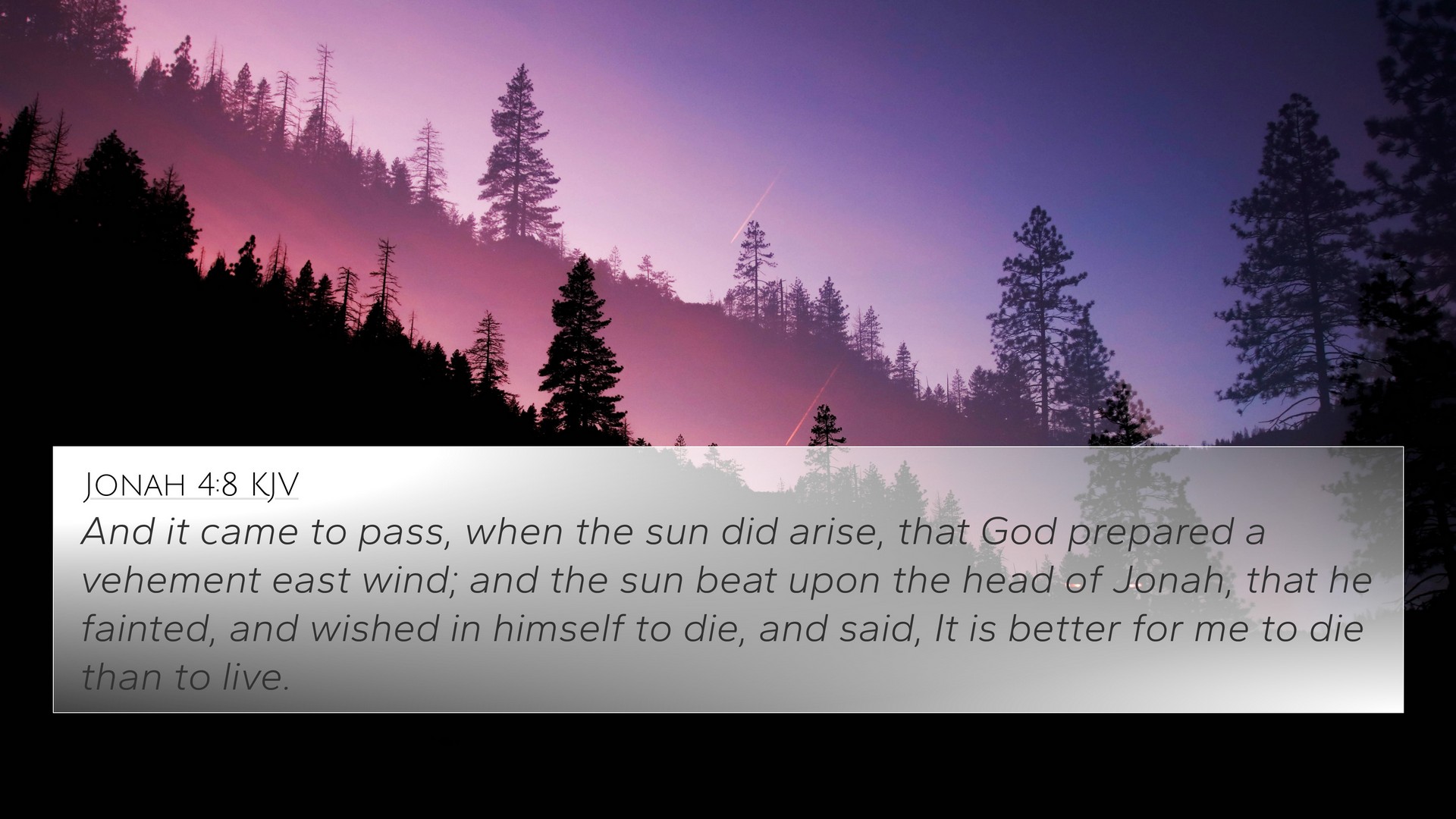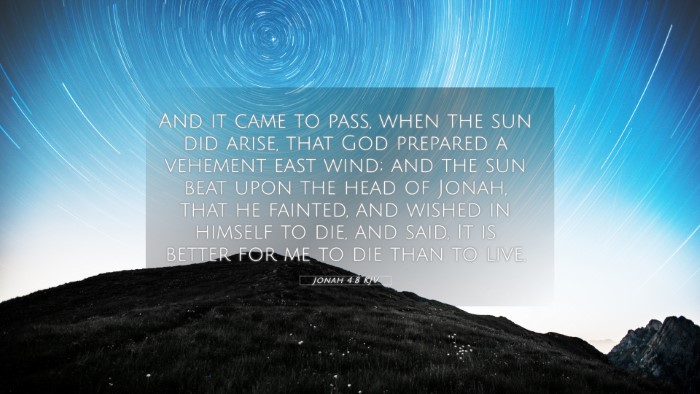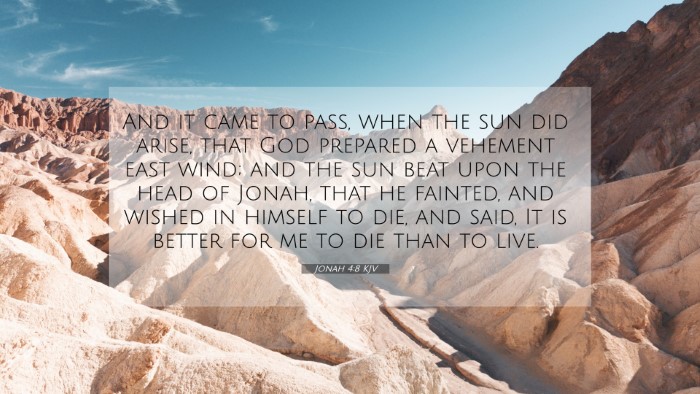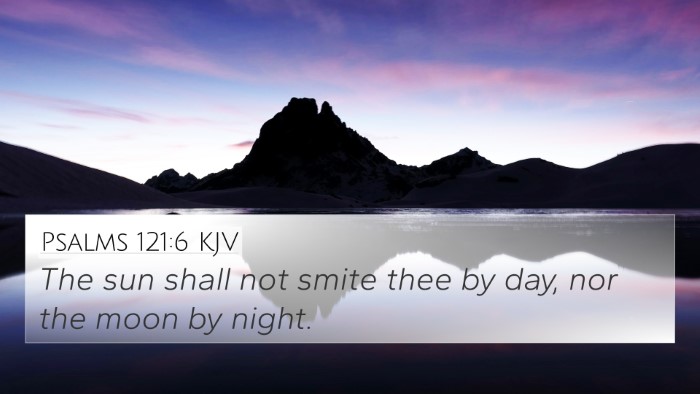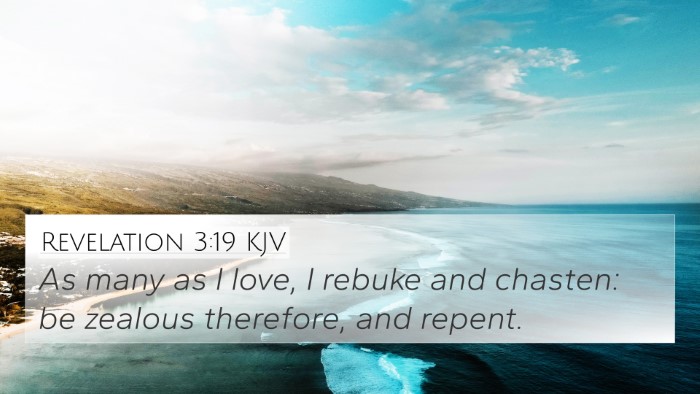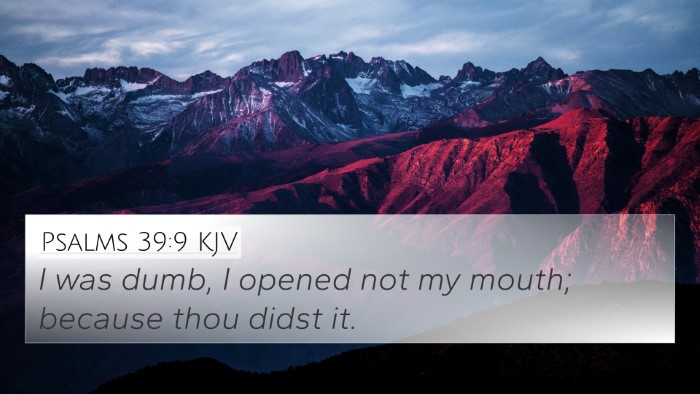Old Testament
Genesis Exodus Leviticus Numbers Deuteronomy Joshua Judges Ruth 1 Samuel 2 Samuel 1 Kings 2 Kings 1 Chronicles 2 Chronicles Ezra Nehemiah Esther Job Psalms Proverbs Ecclesiastes Song of Solomon Isaiah Jeremiah Lamentations Ezekiel Daniel Hosea Joel Amos Obadiah Jonah Micah Nahum Habakkuk Zephaniah Haggai Zechariah MalachiJonah 4:8 Similar Verses
Jonah 4:8 Cross References
And it came to pass, when the sun did arise, that God prepared a vehement east wind; and the sun beat upon the head of Jonah, that he fainted, and wished in himself to die, and said, It is better for me to die than to live.
Uncover the Rich Themes and Topics of This Bible Verse
Listed below are the Bible themes associated with Jonah 4:8. We invite you to explore each theme to gain deeper insights into the Scriptures.
Jonah 4:8 Cross Reference Verses
This section features a detailed cross-reference designed to enrich your understanding of the Scriptures. Below, you will find carefully selected verses that echo the themes and teachings related to Jonah 4:8 KJV. Click on any image to explore detailed analyses of related Bible verses and uncover deeper theological insights.
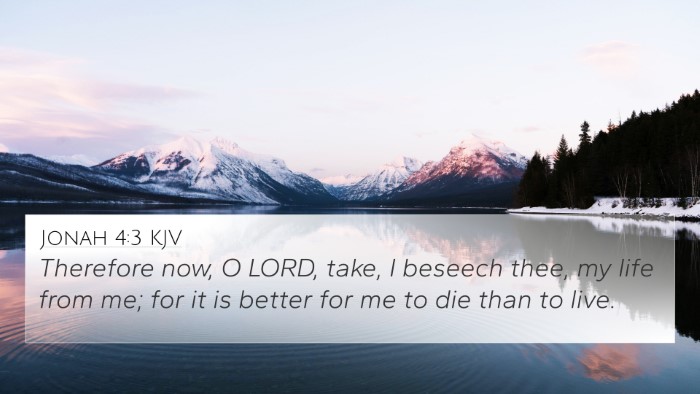
Jonah 4:3 (KJV) »
Therefore now, O LORD, take, I beseech thee, my life from me; for it is better for me to die than to live.
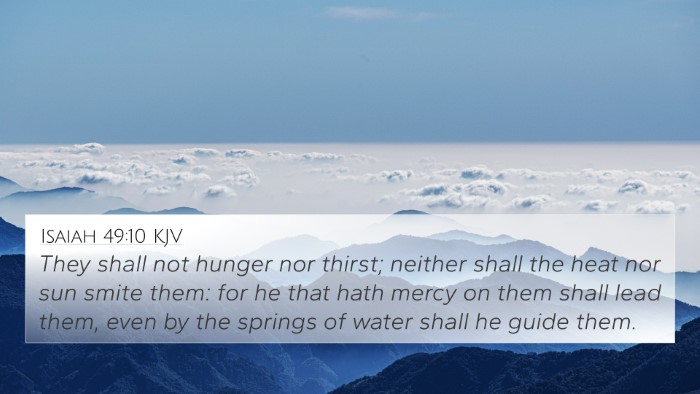
Isaiah 49:10 (KJV) »
They shall not hunger nor thirst; neither shall the heat nor sun smite them: for he that hath mercy on them shall lead them, even by the springs of water shall he guide them.
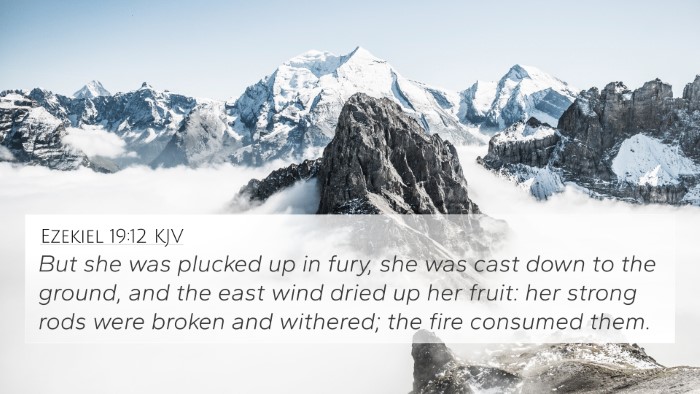
Ezekiel 19:12 (KJV) »
But she was plucked up in fury, she was cast down to the ground, and the east wind dried up her fruit: her strong rods were broken and withered; the fire consumed them.
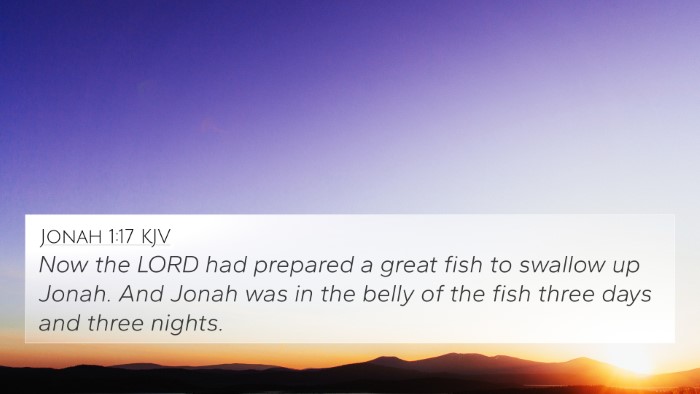
Jonah 1:17 (KJV) »
Now the LORD had prepared a great fish to swallow up Jonah. And Jonah was in the belly of the fish three days and three nights.
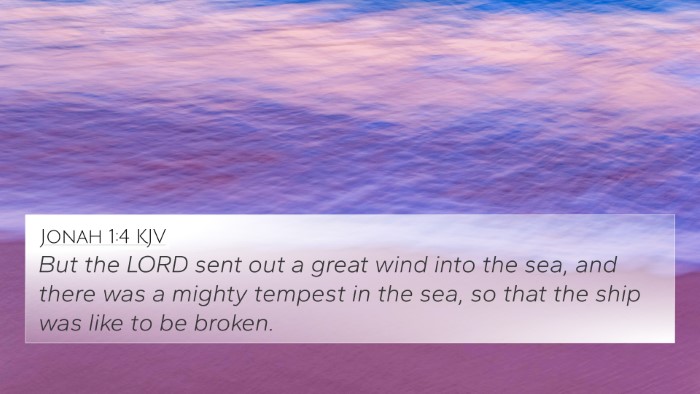
Jonah 1:4 (KJV) »
But the LORD sent out a great wind into the sea, and there was a mighty tempest in the sea, so that the ship was like to be broken.

Jonah 4:6 (KJV) »
And the LORD God prepared a gourd, and made it to come up over Jonah, that it might be a shadow over his head, to deliver him from his grief. So Jonah was exceeding glad of the gourd.
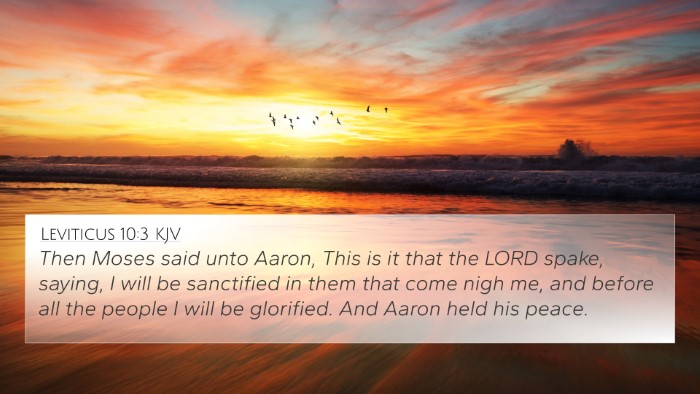
Leviticus 10:3 (KJV) »
Then Moses said unto Aaron, This is it that the LORD spake, saying, I will be sanctified in them that come nigh me, and before all the people I will be glorified. And Aaron held his peace.
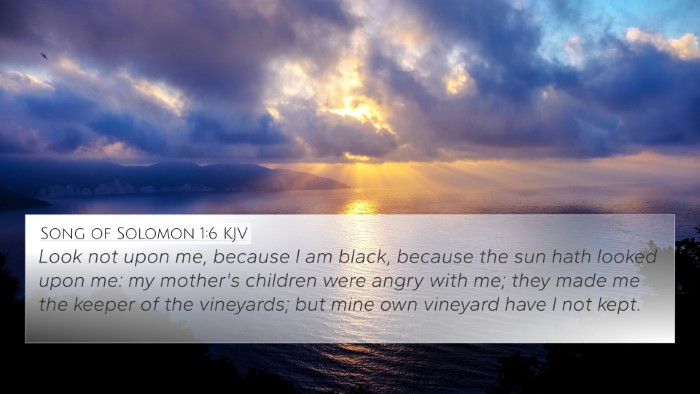
Song of Solomon 1:6 (KJV) »
Look not upon me, because I am black, because the sun hath looked upon me: my mother's children were angry with me; they made me the keeper of the vineyards; but mine own vineyard have I not kept.
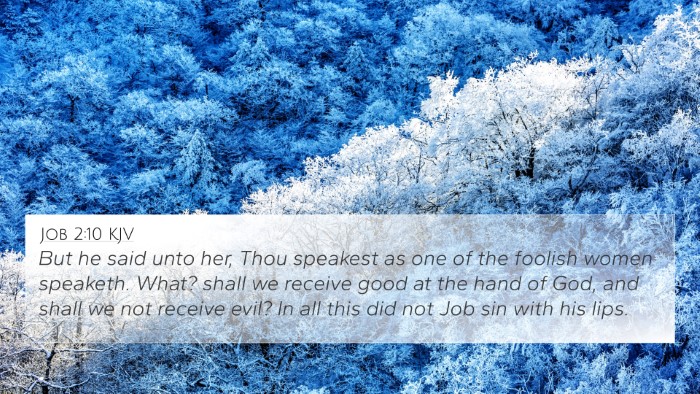
Job 2:10 (KJV) »
But he said unto her, Thou speakest as one of the foolish women speaketh. What? shall we receive good at the hand of God, and shall we not receive evil? In all this did not Job sin with his lips.
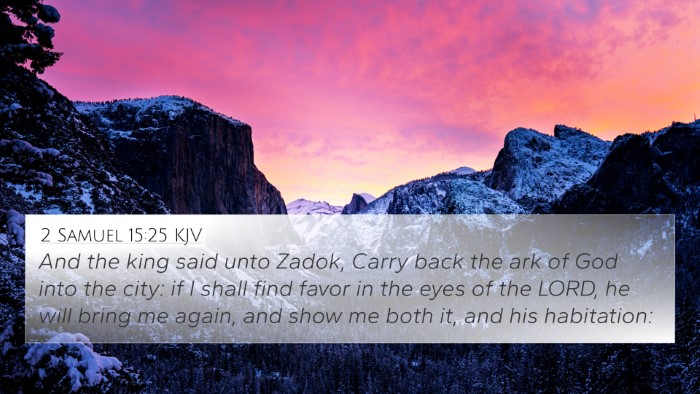
2 Samuel 15:25 (KJV) »
And the king said unto Zadok, Carry back the ark of God into the city: if I shall find favor in the eyes of the LORD, he will bring me again, and show me both it, and his habitation:
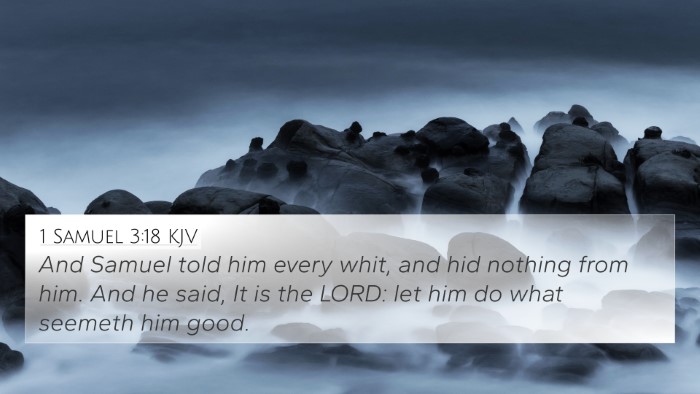
1 Samuel 3:18 (KJV) »
And Samuel told him every whit, and hid nothing from him. And he said, It is the LORD: let him do what seemeth him good.
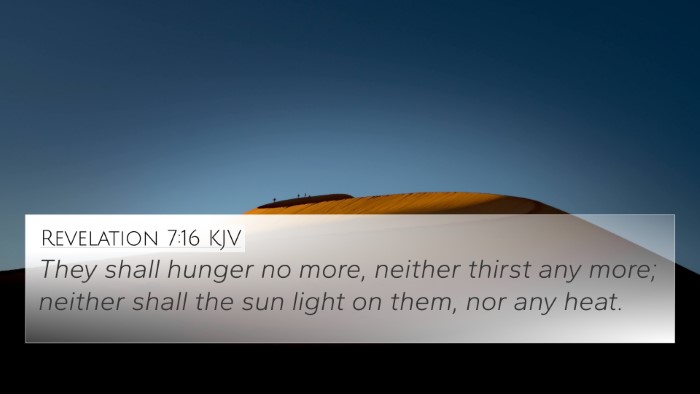
Revelation 7:16 (KJV) »
They shall hunger no more, neither thirst any more; neither shall the sun light on them, nor any heat.
Jonah 4:8 Verse Analysis and Similar Verses
Understanding Jonah 4:8
Verse: Jonah 4:8 - "And it came to pass, when the sun did arise, that God prepared a vehement east wind; and the sun beat upon the head of Jonah, that he fainted, and wished in himself to die, and said, It is better for me to die than to live."
Summary of Insights
This verse occurs in a pivotal moment of the Book of Jonah, where Jonah is dealing with the consequences of his previous actions and his emotional turmoil regarding God's mercy towards Nineveh. The verse reveals Jonah's despair as he faces physical discomfort, symbolized by the fierce wind and scorching sun, which leads him to a state of wishing for death rather than enduring his current situation.
Contextual Background
Jonah is a prophet who initially fled from God's command to preach to the city of Nineveh. After a series of events, including being swallowed by a great fish, Jonah eventually obeys God's command. The repentance of Nineveh leads to Jonah's frustration and disappointment, as he wished doom upon the city instead of its restoration. This illustrates a struggle between divine mercy and human anger.
Commentary Insights
-
Matthew Henry's Commentary:
Henry emphasizes that Jonah’s response reflects not only his personal grievances but also a larger question of God’s justice and the extend of His mercy. Jonah's fainting symbolizes his spiritual state as he contemplates God's compassion towards the repentant Ninevites.
-
Albert Barnes' Notes:
Barnes draws attention to the nature of God’s providential actions. The vehement east wind serves to remind Jonah of God’s control over all creation. It demonstrates that God can use nature to teach lessons to His servants, revealing Jonah’s selfishness and desire for self-pity.
-
Adam Clarke's Commentary:
Clarke notes that the sun beating down upon Jonah reflects the intense pressure he felt, both physically and emotionally. He argues that Jonah's wish to die signifies a profound mental exhaustion and despair, emphasizing how the prophet's internal struggle mirrors external circumstances.
Inter-Biblical Connections
This verse can be explored through various lenses of cross-referencing Biblical texts. Here are significant connections and themes it relates to:
- Job 3:11-12: Job expresses a desire for death in the face of his own suffering, similar to Jonah's situation.
- 1 Kings 19:4: Elijah, like Jonah, wished for death during a time of great distress, highlighting the loneliness and despair often faced by prophets.
- Matthew 26:38: Jesus expressed sorrow to the point of death in Gethsemane, connecting to Jonah's despair.
- Romans 9:1-3: Paul reflects on his anguish for his kin, drawing parallels to Jonah's deep concern for Israel's fate.
- Psalm 42:5: The psalmist discusses hopelessness, mirroring Jonah’s emotional turmoil.
- Isaiah 54:7: God’s promise to restore what was lost resonates with the theme of mercy seen in Jonah's story.
- Revelation 3:17: The plight of feeling lost despite being materially blessed resonates with Jonah’s confused state regarding God’s mercy.
Thematic Elements
The themes of despair, mercy, and human emotion in Jonah 4:8 echo throughout scripture, creating a rich tapestry of understanding of God's interaction with His prophets and the broader implications of His mercy. This verse is a profound reminder of our human vulnerabilities despite divine calling and purpose.
Conclusion
Jonah 4:8 serves as a critical point of reflection on the nature of human emotion in the face of divine providence. Through the cross-referencing of other Bible verses, we see how this theme of despair and the need for understanding God's mercy is echoed throughout scripture, inviting readers into a deeper contemplation of their own spiritual struggles.
